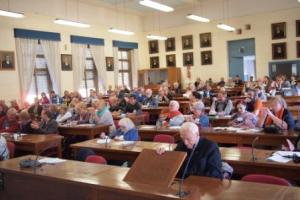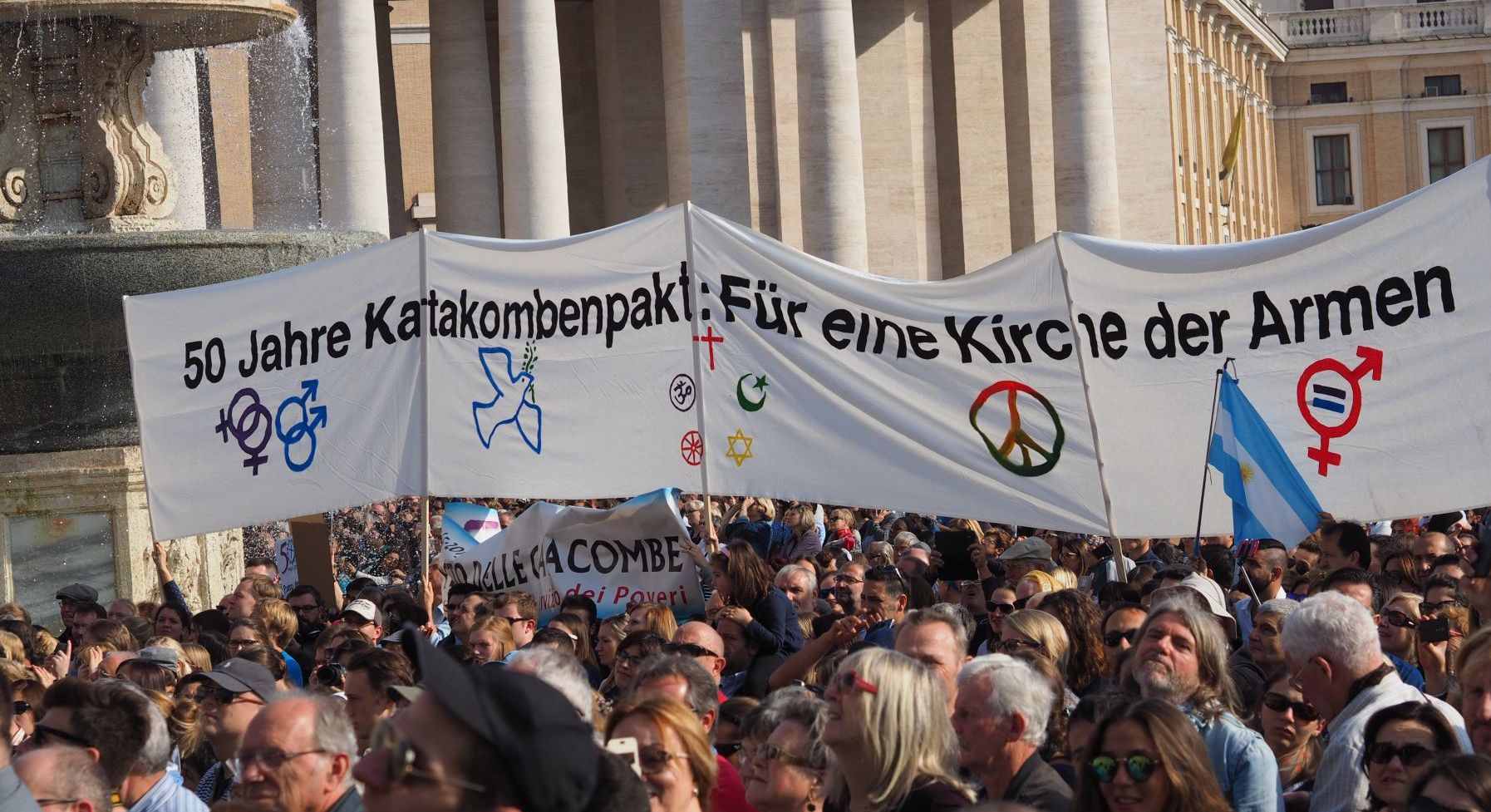 Am heutigen Abend wurde die Versammlung „Katakombenpakt erinnern und erneuern“ in Rom eröffnet. Vor über 250 Teilnehmerinnern aus Basis- und Reformgruppen sprach der Theologe Michael Ramminger davon, dass angesichts der Not in der Welt die katholische Kirche ihre Glaubwürdigkeit nur zurückgewinnen könne, wenn sie sich grundsätzlich den Armen und Ausgegrenzten zuwende. Dies impliziere auch, den eigenen Ort zu riskieren, d.h., sich – sinnbildlich gesprochen – in den Katakomben, also im Untergrund, wiederzufinden.
Am heutigen Abend wurde die Versammlung „Katakombenpakt erinnern und erneuern“ in Rom eröffnet. Vor über 250 Teilnehmerinnern aus Basis- und Reformgruppen sprach der Theologe Michael Ramminger davon, dass angesichts der Not in der Welt die katholische Kirche ihre Glaubwürdigkeit nur zurückgewinnen könne, wenn sie sich grundsätzlich den Armen und Ausgegrenzten zuwende. Dies impliziere auch, den eigenen Ort zu riskieren, d.h., sich – sinnbildlich gesprochen – in den Katakomben, also im Untergrund, wiederzufinden.In einem Gespräch zwischen Pfarrer Norbert Arntz und dem international anerkannten Vatikanexperten Marco Politi war der Zusammenhang zwischen dem Katakombenpakt von 1965, der den nachkonziliaren Beginn einer Kirche der Armen markierte und der Linie von Papst Franziskus Thema. Die Gesprächspartner waren sich darüber einig, dass es eine deutliche Übereinstimmung zwischen beiden gäbe. 1965 verpflichteten sich über vierzig Bischöfe, alles in ihren persönlichen und politischen Möglichkeiten stehende zu tun, um die Bewegungen der (und in Solidarität mit) Armen und Ausgegrenzten zu unterstützen. Genauso fordert Papst Franziskus heute eine Kirche, die alles tut, um der Tatsache, dass „diese Wirtschaft tötet“, in Ende zu bereiten. Politi wies noch einmal darauf hin, dass es Papst Franziskus auch um einen Umbau der kirchlichen Machtstrukturen geht, die ein erhebliches Hindernis für eine Umkehr der Kirche zu ihrer Ursprungsbotschaft darstellen.
In den nächsten Tagen werden Mitglieder aus Basisgruppen und BefreiungstheologInnen aus aller Welt Möglichkeiten und Notwendigkeiten einer Kirche an der Seite der Armen und Ausgegrenzten diskutieren.
Miércoles, 11 de Noviembre 2015 / Recordar y renovar el Pacto de las Catacumbas!
Un comienzo prometedor de los eventos recordando el Pacto de las Catacumbas
Esta tarde ha empezado la asamblea “Recordar y renovar el Pacto de las Catacumbas” en Roma. Participan más que 250 personas de comunidades de base, del movimiento para la reforma de la Iglesia y estudiantes de teología. El teólogo Michael Ramminger del Instituto de Teología y Política en Munster habló sobre la motivación de la asamblea y afirmó que, en vista de la emergencia en el mundo, la iglesia católica sólo puede recuperar su credibilidad si se vuelve hacia los pobres y marginados. Eso implica también arriesgar el propio lugar social, es decir – en un sentido gráfico – encontrarse en la clandestinidad.
En un diálogo entre Norbert Arntz quien tradujo el texto del Pacto de las Catacumbas al Alemán y Marco Politi un experto para el Vaticano hablaron sobre la conexión entre el Pacto de las Catacumbas de 1965 y la linea del Papa Francisco. Con el Pacto de las Catacumbas 40 obispos se obligaban a hacer todo en su poder personal y político para apoyar al movimiento de (y en solidaridad con) los pobres y marginados. Igualmente Papa Francisco demanda hoy una Iglesia que hace todo lo posible para acabar con el hecho que “esta economía mata”. Politi subrayó que Francisco también quiere reconstruir las estructuras eclesiales de poder, porque son un obstáculo grande para la conversión de la Iglesia a su mensaje original.
En los días que vienen los participantes de la asamblea, miembros de grupos de base y teólogos y teólogas de liberación van a discutir sobre la necesidad y la posibilidad de una Iglesia al lado de los pobres y marginados.
Wednesday, November 11th 2015 / Commemorate and renew the Pact of the Catacombs!
A promising start of the events commemorating the Pact of the Catacombs
This evening the conference „Commemorate and renew the Pact of the Catacombs!“ in Rome was opened. In front of 250 participants from christian grassroot groups and church reform movements the theologian Michael Ramminger from the Institute of Theology and Politics (Münster, Germany) spoke about the necessity of the church turning itself fundamentally to the poor and excluded. He stated that in the face of the poverty and need in the world this is the only way for the catholic church to regain credibility. This also implies to risk the own place in society and, to express it symbolically, to go back to the catacombs, to the underground.
Pastor Norbert Arntz and the Journalist and internationally recognized Vatican-expert Marco Politi discussed about the connection between the Pact of the Catacombs of 1965 that marked the beginning of the church of the poor and the policy of Pope Francis. They agreed about the congruence between the both. 1965 more than forty bishops obligated themselves to do everything in their personal and political power to support the movement of (and in solidarity with) the poor and the excluded. In almost the same manner Pope Francis demands today a church that does everything to end the fact that “this economy kills”. Politi pointed out the effort of Francis to reconstruct the ecclesiastical structures of power which are a big hindrance for the church and keep it from returning to its original message.
In the upcoming days members of the christian grassroot movement and theologians following the theology of liberation from all parts of the world will discuss the possibilities and necessities of a church at the side of the poor and excluded.
